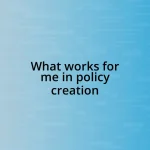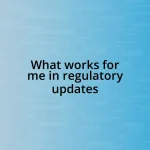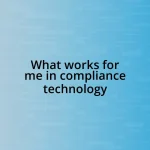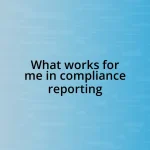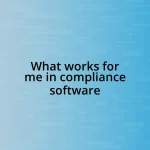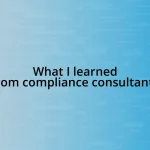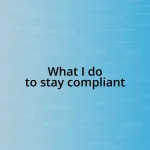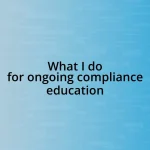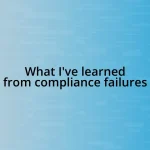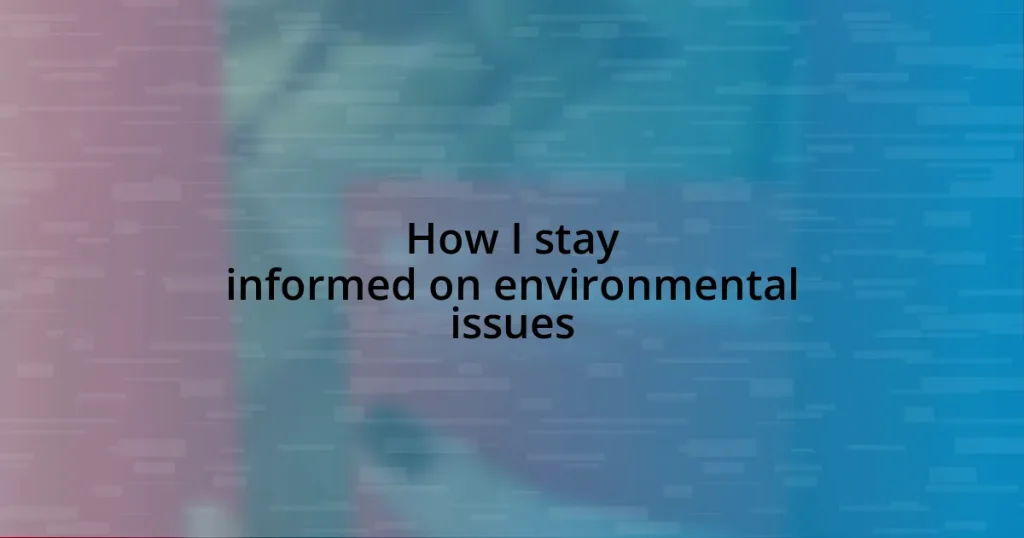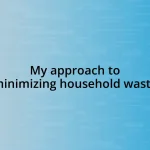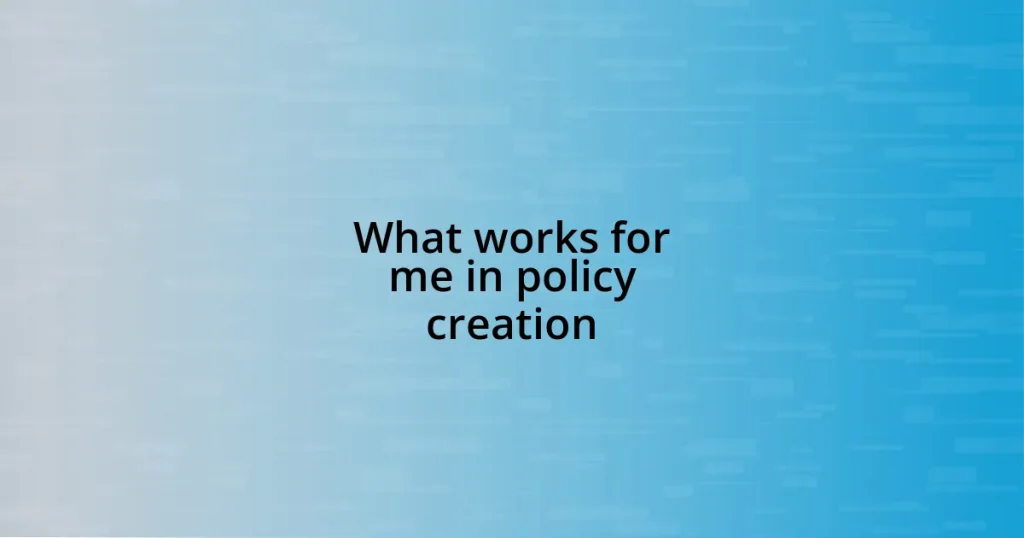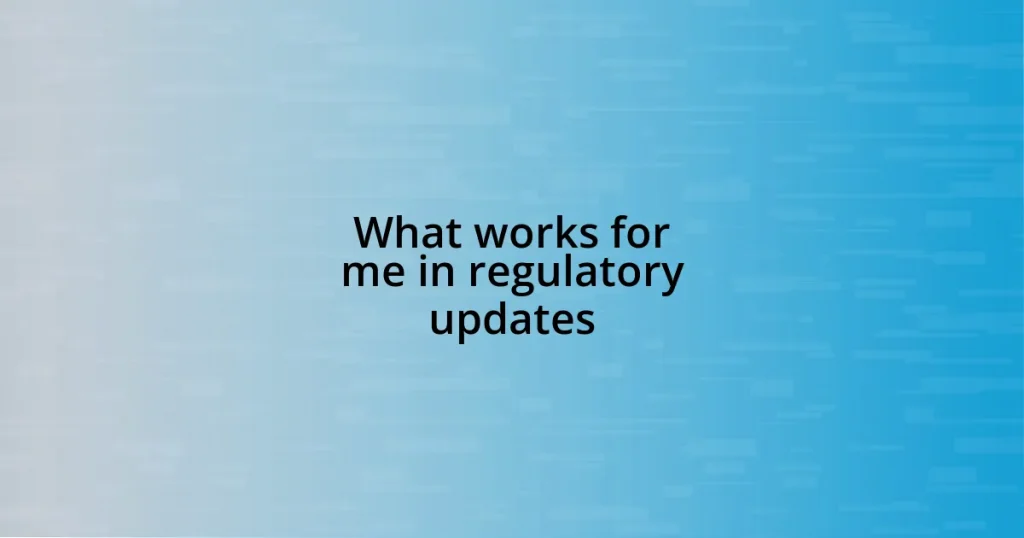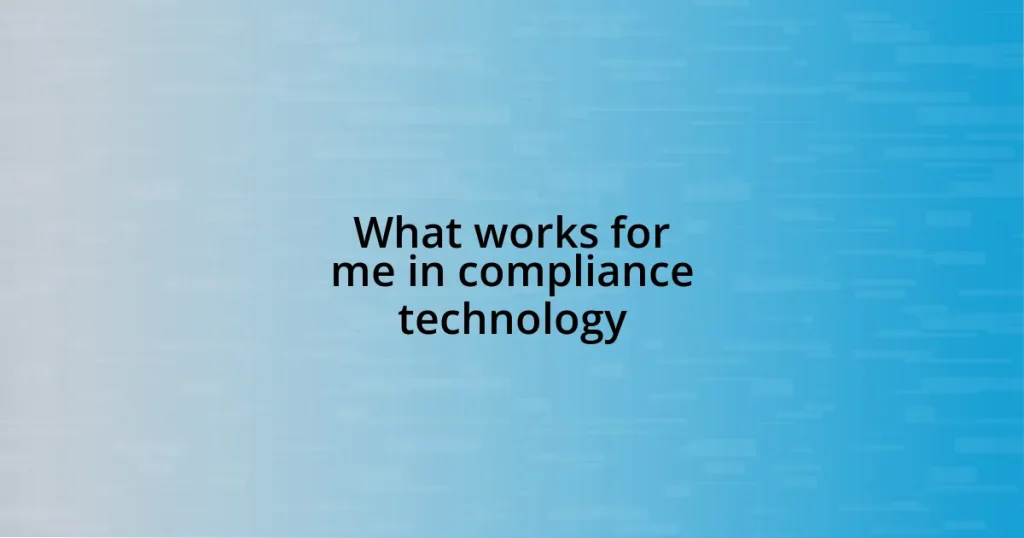Key takeaways:
- Finding reliable news sources involves seeking established organizations known for fact-checking and transparency.
- Engaging with environmental organizations through newsletters and events not only keeps individuals informed but also fosters community and social connections.
- Utilizing social media effectively can enhance understanding and inspire action by connecting with like-minded individuals and influential voices.
- Participation in community forums and local events allows for diverse perspectives and personal connections that can motivate collective environmental action.
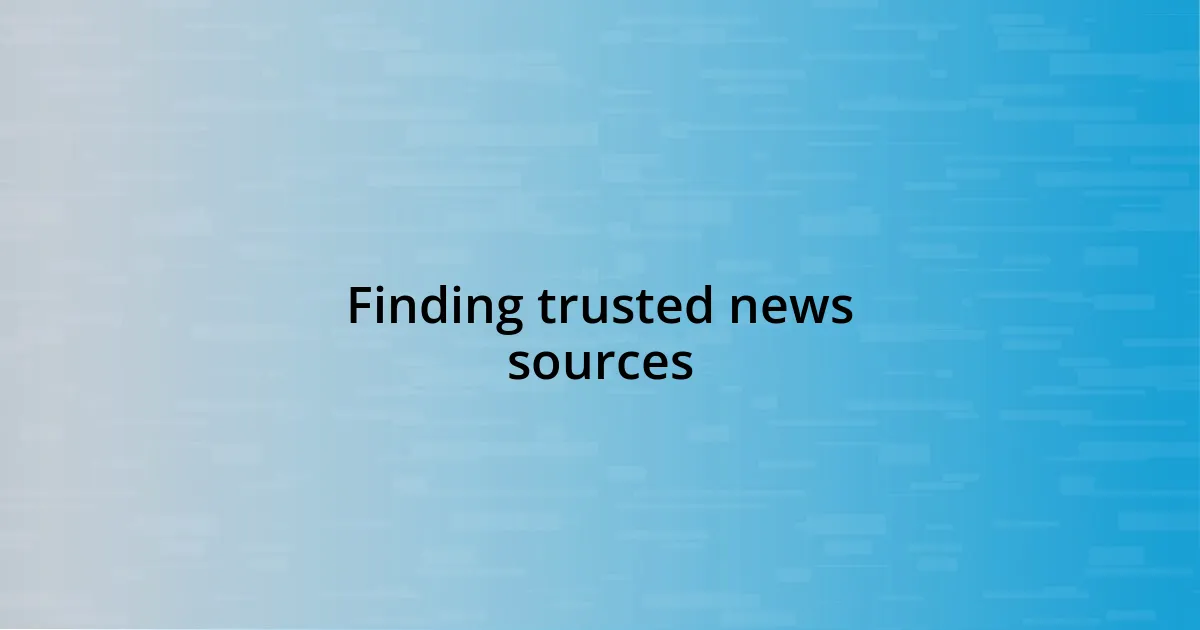
Finding trusted news sources
Finding trusted news sources can be a daunting task, especially with the overwhelming amount of information available online. I often ask myself, “Which sources can I truly rely on?” For me, the answer lies in looking for established organizations with a strong history of fact-checking and transparency. It’s comforting to know that there are outlets dedicated to accuracy, and I always feel a sense of peace when I find those.
When I first started diving deeper into environmental issues, I relied heavily on recommendations from friends and colleagues who share my passion for sustainability. Their suggestions opened doors to some gems, including local and international environmental organizations that provide insightful reports and articles. I still remember the thrill I felt discovering a smaller, lesser-known publication that offered in-depth analysis on climate change policies—it was like uncovering a hidden treasure.
Another strategy I employ is cross-referencing reports from various sources. This habit not only boosts my confidence in the information but also helps me understand different angles on the same issue. I often ponder over the idea that each publication has its own lens. By comparing how different outlets report on the same topic, I can piece together a more comprehensive snapshot of what’s truly happening in the environmental world. This approach brings a richer context to the issues I care so much about.
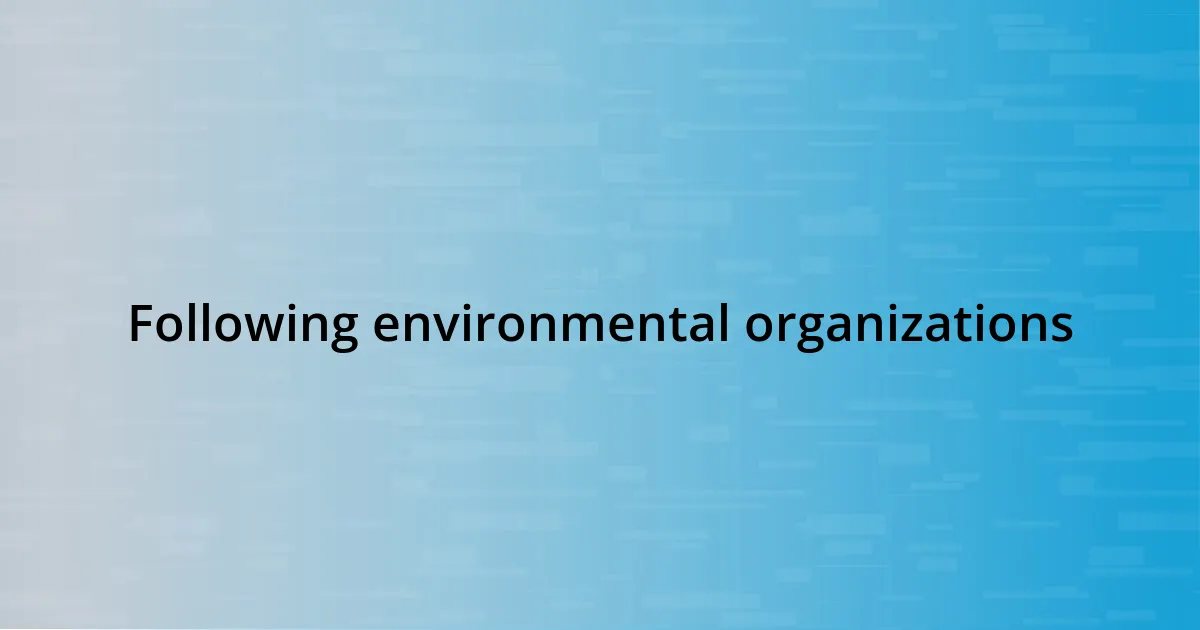
Following environmental organizations
Following environmental organizations is one of my favorite ways to stay informed. There’s something empowering about connecting with those who are deeply passionate about the same issues I care about. For instance, I remember attending a virtual seminar hosted by a well-known environmental group. The energy and commitment from the speakers ignited a spark in me, reaffirming my belief that collective action truly makes a difference.
Additionally, subscribing to newsletters from these organizations has been a game changer. I’ve found that the curated content provides digestible updates on environmental policies and initiatives. One day, as I opened a newsletter from a local conservation group, I stumbled upon an article about a community cleanup event. Motivated, I joined in and met like-minded individuals, creating friendships centered around our shared commitment to the planet. It’s astonishing how following these organizations has not only kept me informed but also enriched my social life.
It’s crucial to seek information from organizations that focus specifically on areas I’m passionate about, such as wildlife conservation or renewable energy. Each organization has its unique approach, which can shape my understanding of complex issues. I often reflect on how the insights I’ve gained from these sources have shifted my perspective on simple daily choices, like opting for reusable products instead of single-use plastics. Each article I read feels like a new piece of a puzzle, guiding me toward a better, more sustainable lifestyle.
| Environmental Organization | Focus Area |
|---|---|
| WWF (World Wildlife Fund) | Wildlife Conservation |
| Sierra Club | Advocacy for Clean Energy |
| Greenpeace | Climate Change and Pollution |
| Environmental Defense Fund | Sustainable Solutions and Policies |
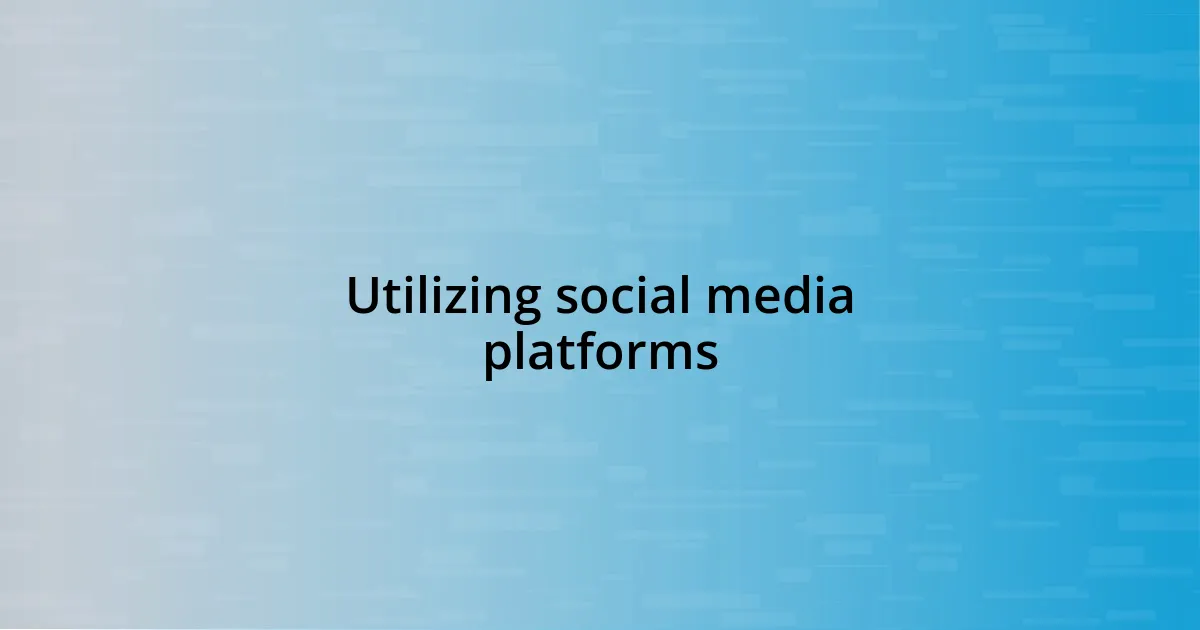
Utilizing social media platforms
Utilizing social media platforms has transformed the way I stay informed about environmental issues. I often scroll through my feeds during a coffee break, and it surprises me how much valuable content pops up. For instance, one day, I stumbled upon a compelling infographic shared by a climate activist that illustrated the impact of deforestation on biodiversity. It made the statistics hit home in a way that plain text couldn’t. Engaging with communities online has allowed me to witness the collective voices advocating for change. It feels democratically vibrant and inspires me to share my thoughts as well.
Here are a few strategies I use to harness the power of social media effectively:
- Follow influential voices: I seek out scientists, activists, and educators who share trustworthy insights and personal experiences. Their authenticity often draws me deeper into critical issues.
- Join dedicated groups: Being part of Facebook groups or Reddit communities focused on environmental action helps me connect with others who are equally passionate. We share articles, tips, and motivate each other to act.
- Engage with content: I make a point to comment and participate in discussions on platforms like Twitter and Instagram. This interaction not only deepens my understanding but helps build a network of supportive friends.
- Stay updated with hashtags: I follow specific hashtags related to environmental topics. This way, I can quickly access a wide range of perspectives and updates without sifting through unrelated information.
- Share and create: I don’t just consume content; I also share articles that resonate with me. I remember posting about a local sustainability initiative and getting feedback that encouraged me to explore even more ways to contribute.
By employing these strategies, I find that social media isn’t merely a tool for consumption; it’s also a platform for action, connection, and continuous learning.

Subscribing to newsletters
Subscribing to newsletters has become an integral part of my routine when it comes to environmental awareness. Each time a fresh edition lands in my inbox, I can’t help but feel a sense of anticipation—what new information will it bring? Last week, I received a newsletter from a climate action group that highlighted innovative green technologies being developed worldwide. That article not only educated me but also reignited my hope for the future.
I cherish how these newsletters distill complex environmental issues into bite-sized information. For example, I once discovered a concise piece in a newsletter regarding local legislation aimed at reducing plastic waste. It motivated me to attend a city council meeting, where I learned how community involvement could influence policy decisions. Have you ever felt that rush of empowerment when you realize your voice can contribute to real change? I certainly did, and it was an eye-opening experience.
Another aspect I appreciate is the curated lists of events and initiatives featured in these newsletters. They serve as a reminder of how interconnected our actions can be. Just last month, I read about a garden initiative promoting native plant species. I decided to volunteer, and not only did I learn about sustainable gardening practices, but I also met folks who have become good friends. It’s amazing how a simple newsletter can foster connections and inspire action toward a common cause.
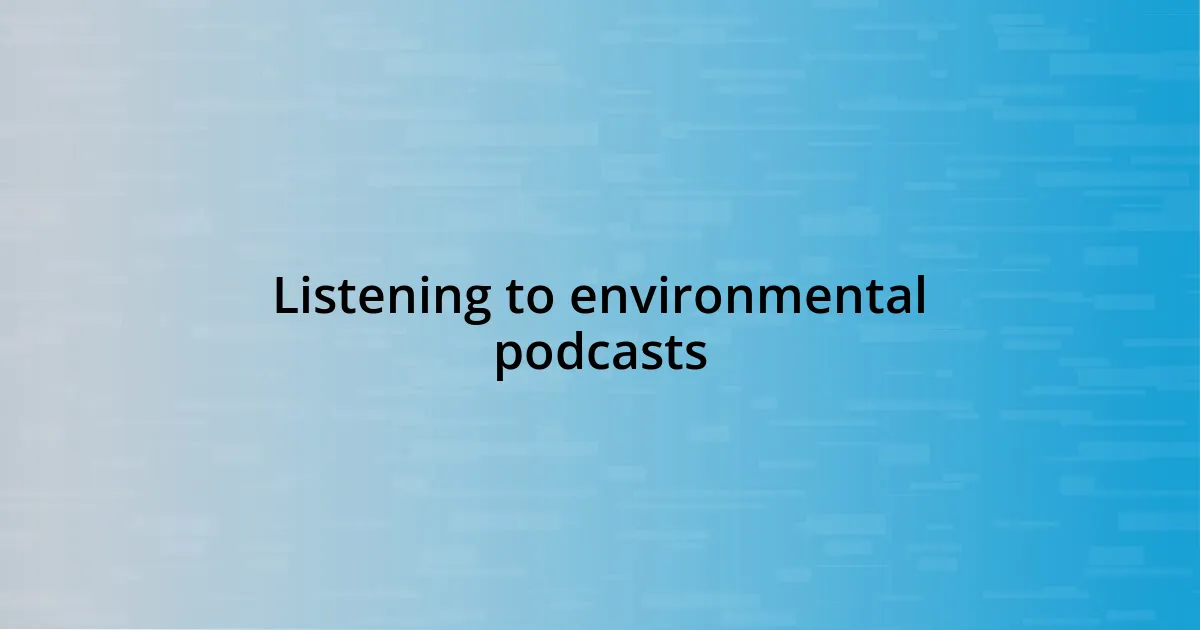
Listening to environmental podcasts
Listening to environmental podcasts has truly enriched my understanding of the intricacies of ecological issues. I remember the first time I tuned into an episode on ocean conservation—it was like opening a window to a world I didn’t realize was in such peril. Hearing scientists and activists share their stories created a vivid emotional connection to the topics. Have you ever listened to something that made you rethink your everyday actions? I certainly did, and it pushed me to be more mindful about my plastic consumption.
One podcast that has become a staple in my routine features guests who are pioneers in sustainable solutions. Each episode dives into real-world applications of environmental science that often leave me inspired. I particularly enjoyed an episode that showcased an initiative turning food waste into energy. It ignited my curiosity about local programs I hadn’t explored before. Isn’t it fascinating how storytelling through audio can motivate us to take tangible steps toward change? It’s a powerful reminder that information is most impactful when it resonates on a personal level.
The beauty of podcasts is their accessibility—they’re perfect for multitasking. I often listen while taking a walk or during my commute. This blend of learning and movement keeps me engaged and physically active. Recently, I listened to a series on urban sustainability that encouraged me to start a community recycling group. It’s incredible how a simple play button can lead to community engagement. Have you ever thought about what small shift in your habits could lead to larger initiatives? For me, it started with tuning in.
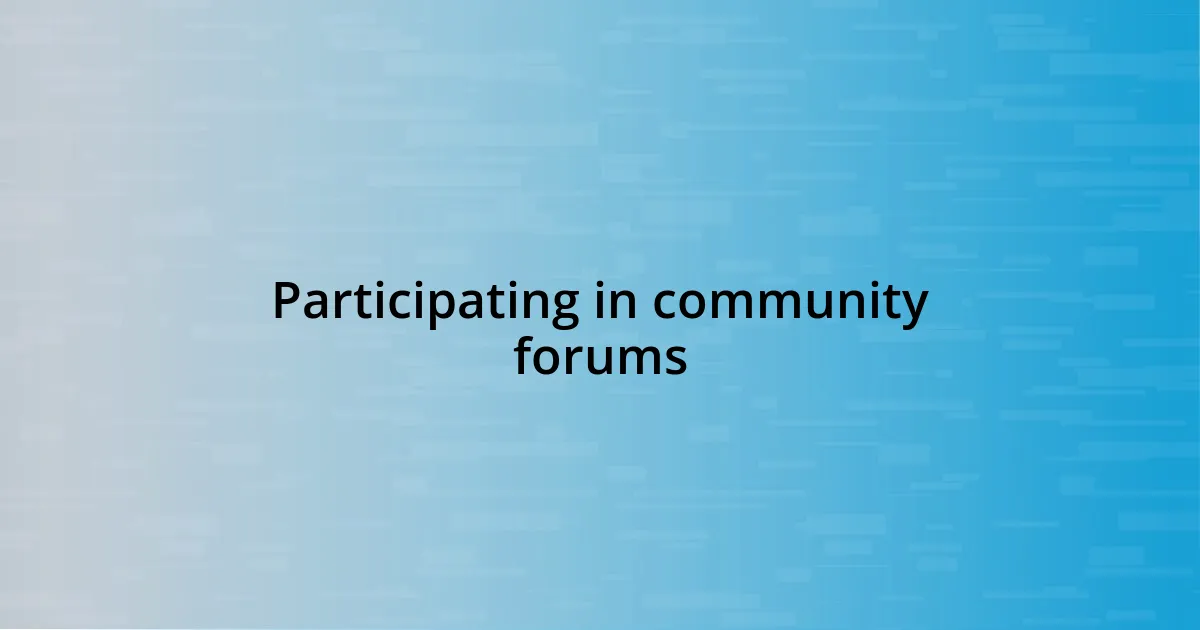
Participating in community forums
Participating in community forums has been an enlightening experience for me when it comes to understanding and engaging with environmental issues. I recall attending a town hall meeting focused on renewable energy initiatives in my area. The buzz in the room was palpable as residents voiced their concerns and ideas. Have you ever felt a collective energy when discussing something you care about? It’s invigorating to see so many people passionate about making a difference.
One of my favorite parts about these forums is the variety of perspectives shared. During a recent discussion on local air quality, I listened to a single mother share her worries about her children’s health. Her heartfelt story resonated with me in ways I hadn’t anticipated. It made me reflect on how environmental issues intersect with our daily lives and the health of our communities. It’s these personal narratives that can provoke a strong emotional response and inspire action.
Engagement doesn’t stop at just listening; it’s also about connecting with others. After one forum, I ended up striking up a conversation with a local environmental activist. We exchanged ideas and ended up collaborating on a neighborhood clean-up event. That experience highlighted how forums can foster personal relationships that lead to tangible actions. Have you ever thought about how a single conversation could spark a larger movement? For me, it was a powerful reminder that community-building is an essential part of addressing environmental challenges.
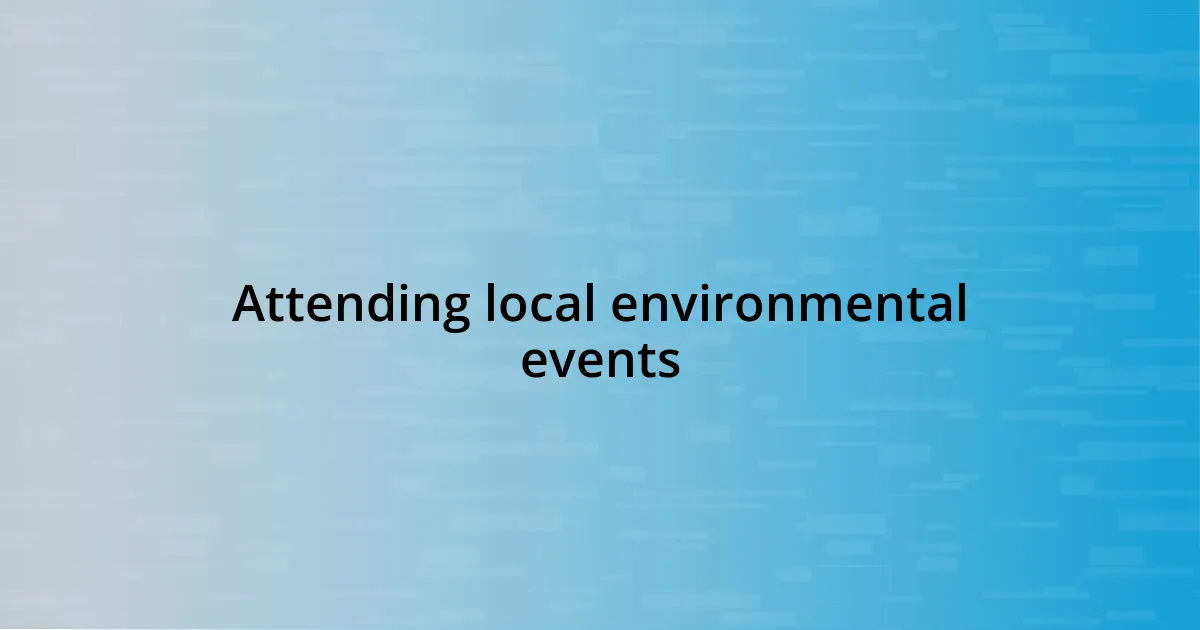
Attending local environmental events
Attending local environmental events has truly been a game changer in how I stay informed and engaged. I vividly recall walking into a farmer’s market themed around sustainability last summer. The vibrant stalls and passionate vendors pulled me in immediately. Have you experienced that electric atmosphere when everyone around you shares a common purpose? I remember chatting with a local farmer who was dedicated to organic practices. His insights on soil health not only deepened my understanding of food systems but also made me appreciate the importance of supporting local agriculture.
One memorable event I attended was a community tree planting day. I was surrounded by people of all ages, wielding shovels and laughter as we dug into the earth. The simple act of planting trees transformed into a shared celebration of hope for the future of our planet. It was heartwarming to witness kids enthusiastically learning about the role of trees in combating climate change; their curiosity was infectious. Have you ever felt that sense of unity in a group project that makes the effort so worthwhile? For me, it was exhilarating, reminding me that every small action contributes to a larger impact.
Moreover, these events often feature inspiring speakers who share their insights and experiences. I once attended a panel discussion with activists tackling climate justice issues. Listening to their stories was like a wake-up call; their passion was contagious, and it left me questioning what more I could do. It was a powerful moment, realizing that being informed isn’t just about attending events—it’s about taking that knowledge and channeling it into action. Isn’t it amazing how one afternoon can shift your perspective and ignite a personal commitment to advocacy? I walked away that day feeling not only informed but also personally invested in the changes I wanted to see in my community.

